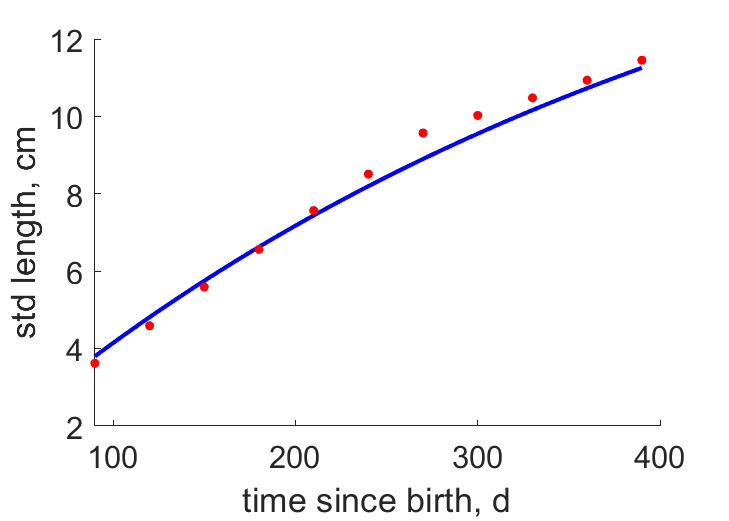Predictions & Data for this entry
| Model: std | climate: MA | migrate: | phylum: |
| COMPLETE = 1.5 | ecozone: MI, MPSW | food: bjPz, jiCi | class: |
| MRE = 0.028 | habitat: 0jMp, jiMr | gender: D | order: |
| SMSE = 0.001 | embryo: Mp | reprod: O | family: |
Zero-variate data
| Data | Observed | Predicted | (RE) | Unit | Description | Reference |
|---|---|---|---|---|---|---|
| ab | 3.7 | 3.757 | (0.01552) | d | age at birth | guess |
| am | 5475 | 5475 | (1.671e-05) | d | life span | guess |
| Lp | 8 | 8.546 | (0.06824) | cm | total length at puberty | guess |
| Li | 17 | 18.23 | (0.07232) | cm | ultimate total length | fishbase |
| Wwb | 0.000268 | 0.0002682 | (0.0006979) | g | wet weight at birth | guess |
| Wwp | 8 | 7.828 | (0.02155) | g | wet weight at puberty | guess, fishbase |
| Wwi | 75.3 | 75.97 | (0.008952) | g | ultimate wet weight | fishbase |
| Ri | 14.79 | 14.8 | (0.00013) | #/d | maximum reprod rate | guess |
Uni- and bivariate data
| Data | Figure | Independent variable | Dependent variable | (RE) | Reference |
|---|---|---|---|---|---|
| tL |  | time since birth | std length | (0.03293) | GundPopp1975 |
Pseudo-data at Tref = 20°C
| Data | Generalised animal | Sargocentron diadema | Unit | Description |
|---|---|---|---|---|
| v | 0.02 | 0.02335 | cm/d | energy conductance |
| p_M | 18 | 38.25 | J/d.cm^3 | vol-spec som maint |
| k_J | 0.002 | 0.002 | 1/d | maturity maint rate coefficient |
| k | 0.3 | 0.2729 | - | maintenance ratio |
| kap | 0.8 | 0.992 | - | allocation fraction to soma |
| kap_G | 0.8 | 0.8017 | - | growth efficiency |
| kap_R | 0.95 | 0.95 | - | reproduction efficiency |
Discussion
- Author_mod_1: I found information on the number of eggs per female as a function of length in Anon2013 that was much higher than in Anon2015 but chose to not include it as the temperature was not provided
Facts
- length-weight: Ww in g = 0.01622*(TL in cm)^2.98 (Ref: fishbase)
Bibliography